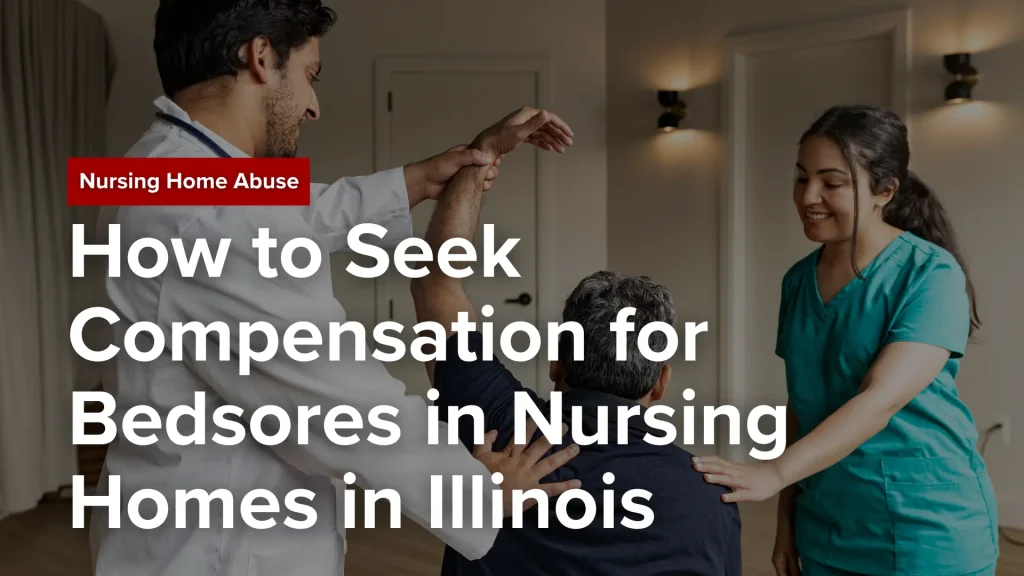
Nursing home neglect can take many forms, making it challenging for family members to identify it. Messy rooms, poor hygiene, malnutrition, and frequent falls can all be signs of neglect. However, one often overlooked sign of neglect is the appearance of bedsores. If proper care was not provided, this issue may entitle families to seek compensation for bedsores in a nursing home.
If your loved one develops bedsores while in a long-term care facility, it could indicate they aren’t receiving the care they need. You must begin taking steps to protect your loved one and seek compensation for their medical expenses, pain, and other losses. Understanding how much a bedsore lawsuit is worth based on the severity of the injury and the facility’s level of negligence.
What Are Bedsores and Why Do They Occur in Nursing Homes?
Bedsores, also known as pressure ulcers or decubitus ulcers, are injuries that can result when parts of the body experience pressure for extended periods. This extended pressure can restrict blood flow and cause painful and sometimes infection-prone spots on the victim’s body.
These injuries can be common in nursing home settings, where residents may spend extended periods sitting in wheelchairs or lying in bed without moving. To reduce the risk of residents developing bedsores, nursing facility staff must regularly help residents get up or change their position. Residents developing bedsores may indicate they are being left alone for hours despite being unable to move independently.
The Dangers of Bedsores
The immediate effect of bedsores is that they are painful. If your loved one has bedsores, they’re likely in pain, even if they’re unable to relay that information to you. Putting pressure on them is painful; even moving with them on your body can be painful.
However, the pain associated with the bedsores is only the start. The risk of infection that comes with bedsores makes them dangerous, particularly for older adults.
The bedsores themselves can become infected, and that infection can spread to other parts of the body, including nearby bones or joints. This can further your loved one’s mobility issues, and in severe cases, can lead to sepsis.
In a worst-case scenario, an infection that started with bedsores could be fatal, especially since many older adults have weakened immune systems.
Are Bedsores Considered Nursing Home Neglect?
While bedsores aren’t always evidence of nursing home neglect, they can indicate that neglect is occurring. This is evidence that nursing home staff aren’t checking up on residents as frequently as they should be or aren’t helping residents with mobility issues.
The reasons why staff aren’t checking up on residents may vary. For example, some nursing facilities may have staffing shortages, which could leave the entire facility liable for resulting injuries, including bedsores. Or, the neglect could be on the part of specific nursing staff who either aren’t taking their job seriously or are intentionally ignoring patients.
Through a nursing home neglect lawsuit, you may be able to hold the at-fault staff member, facility, or both liable for the harm they caused to your loved one. However, your lawyer will need to provide evidence that neglect caused the bedsores, such as:
- Statements from other nursing home residents or staff about the quality of care at the facility
- Medical records detailing the extent and severity of your loved one’s bedsores
- Documentation of injuries and treatments within the nursing facility’s records
What Compensation Can Victims Receive?

When seeking compensation on your loved one’s behalf, you may be able to recover economic, non-economic, and sometimes punitive damages. Damages refer to the money sought through your lawsuit. Economic and non-economic damages are compensatory damages, meaning the cash compensates victims for harm. In contrast, punitive damages are intended to punish wrongdoers for their actions.
Economic Damages
Economic damages compensate victims for their losses with tangible value. In bedsore nursing home neglect cases, this typically means economic damages compensate victims for the medical expenses they incur while treating their condition.
Calculating past medical expenses is usually straightforward, as lawyers can add medical bills. However, they may also need to estimate the cost of future medical treatment if your loved one experiences medical complications related to their bedsores, such as a long-term infection.
Non-Economic Damages
Non-economic damages compensate victims for their losses with intangible value. This includes the physical pain and suffering your loved one experienced, the emotional distress they suffered as a result of their neglect, and the lasting impact their injuries have. For example, if an infection spreads to other parts of their body and they become less mobile than before, you may be able to seek compensation.
Calculating the value of these losses can be challenging due to their subjective nature. This is why it’s essential to work with a compassionate lawyer who understands the suffering your loved one experienced due to their neglect and who will fight for the compensation they deserve.
Punitive Damages
Punitive damages differ from the other types of damages in two key ways. First, they aren’t meant to compensate your loved one for their harm, but rather to punish the nursing facility or staff for their conduct.
The second is that they are rare and only available in cases where the defendant was motivated by evil intent, was recklessly and outrageously indifferent to a highly unreasonable risk of harm, or was consciously indifferent to other people’s rights and safety. This means you must show that the at-fault party knew or should have known that their actions could cause serious harm to your loved one.
If you receive an award of punitive damages in your nursing home neglect case, the law limits the amount to three times your compensatory damages.
Please read more about nursing home responsibility here: The Responsibilities of Nursing Homes
Contact Our Illinois Nursing Home Neglect Lawyers
If you suspect nursing home neglect in Illinois was the cause of your loved one’s bedsores, contact Karlin, Fleisher & Falkenberg, LLC at 312-346-8620 for a free consultation with an experienced and compassionate Illinois injury lawyer. Our team will help you seek the medical treatment your loved one needs and explain your options for holding the nursing home employees and facility financially accountable for the harm they caused.
